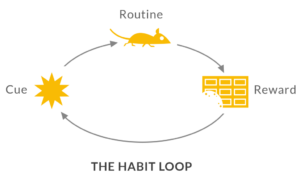I have written in this space about how I am using the quarantine as an opportunity to grow. Specifically, I have been investing a great deal of time building the infrastructure for my private mental performance coaching practice. I moved hot out of the gate during the first two weeks. I wrote multiple blog posts. I checked off daily process goals to ensure that I was acting on my marketing plan. I conducted significant research on technology tools and implemented some of those tools in order to prepare my business for when it scales. Most importantly, I have expanded my client roster in just one month, which allows me to serve others in the role of mental performance coach. All of that sounds great, doesn’t it?

Well, in the last week or two, my motivation has waned significantly. I am going to bed later and waking up later accordingly. I stopped scheduling my days out the night before. I’ve been more easily distracted. On the positive side, my motivation to conduct mental performance coaching sessions with my clients has not diminished. I still very much look forward to speaking with my clients, all of whom are high school athletes. I enjoy working with them on building their mental skills, as well as helping them to navigate new challenges resulting from an extending hiatus from sports and school. So why the difference in my motivation for coaching and building my practice behind the scenes? The answer lies within a more nuanced analysis of how motivational theories and research affect human behavior.
Self-Determination Theory (SDT) is a foundational theory of motivation put forth by Drs. Edward Deci and Richard Ryan. Deci and Ryan (2000) suggest that self-determined motivation falls along a continuum from intrinsic motivation, which is exclusively internally generated, to amotivation, which is an absence of any motivation at all. Characteristics of true intrinsic motivation include enjoyment, interest, and satisfaction (Deci & Ryan, 2000). Lesser forms of intrinsic motivation, including integrated regulation and identified regulation, are characterized by awareness of self and alignment with personal values. In all cases, the individual is performing some task because they genuinely want to do it and because it reflects their inner self.
It’s clear to me that I am intrinsically motivated to serve my clients. My purpose is clear: help individuals to strive toward their potential. I love doing it. It’s fun for me. I learn every time I spend time with a client. It makes me feel good about myself. Interestingly, I am not currently being paid to work with these clients. A number of my clients have spilled over from an unpaid internship. I have also picked up one new high school athlete outside of my internship whom I’ve volunteered to help on a pro-bono basis through the end of the school year as a way of giving back to my community. I can honestly say that my lack of compensation has not affected my desire to serve these young men. I believe that I would do this work for free forever if I could sustain it. Yet, my lack of compensation could be a clue as to why I’ve lost some steam on building my practice behind the scenes.
It’s probably not a stretch to say that the greatest form of feedback that any professional receives on a daily (or weekly or semi-monthly) basis is a paycheck. Compensation is a common external reward for the time, effort, and expertise that we give to our employers and clients. Knowing that I had to get up for work the next day so I could get paid was always a tremendous motivator for me when I worked for traditional employers (i.e., not myself). Nevertheless, for me and many of us, money is not the only motivator when it comes to work. Enjoyment is a motivator. Personal connection is another motivator. Positive reinforcement from those we work for is another motivator. It’s pretty clear that I am receiving little to no feedback from outside sources. Certainly, lack of income deeply hinders my desire to do rote tasks every day because there is no clear, immediate prospect for payback in the near-term. In addition to not getting paid, I am not receiving any non-monetary rewards in the short-term for doing essential, non-client facing responsibilities. For instance, I don’t get a pat on the back from a boss or partner for populating my client management platform or purchasing private practice insurance. It’s simply something that I must do to keep things moving forward. Yet, without any short-term benefit tied to it, it is hard to maintain my motivation to do it.
SDT suggests that under normal circumstances that external rewards, such as a paycheck, may indeed undermine intrinsic motivation. This hypothesis makes sense since an individual may be conditioned to respond to the external feedback detracted from the inherent motivation to continue. I have chased more money more than once during the course of my 20-year business consulting career. Interestingly, though, one study on external rewards suggests small rewards enhance autonomous motivation rather then take away from it (Garaus, Furtmuller, & Guttel, 2016). In fact, it seems that small rewards can enhance persistence as a result of the informational feedback coming back to the individual. Such small rewards would need to be modest enough such that the benefits are almost unnoticeable (Garaus et al., 2016). In my case, it seems worthwhile to incorporate small rewards for completing non-client facing tasks in order to help sustain my effort in the short-term without much feedback from the outside world in the age of COVID-19.

It seems pretty clear to me that an immediate next step will be to invest some time and effort in developing a small reward system to support my practice development efforts. Put another way, I will need to engineer a habit loop in which there is a clear behavioral trigger, a clear action, and a clear reward. Before this self-exploration, I instinctively assumed that revisiting my purpose of helping others would sustain my efforts in building a practice on a daily basis. However, it’s become obvious that a clear long-term vision and clear mission will only go so far. The COVID-19 situation has created a stunning lack of external feedback due to real-life conditions. As a result, I will need to create my own feedback loop through designing small rewards that hopefully don’t usurp my autonomous motivation.
References
Garaus, C., Furtmuller, G., & Guttel, W.H. (2016). The hidden power of small rewards: The effects of insufficient external rewards on autonomous motivation to learn. Academy of Management Learning & Education, 15(1), 45-59.
Ryan, R.M., & Deci, E.L. (2000). Self-determination theory and the facilitation of intrinsic motivation, social development, and well-being. American Psychologist, 55(1), 68-78.

